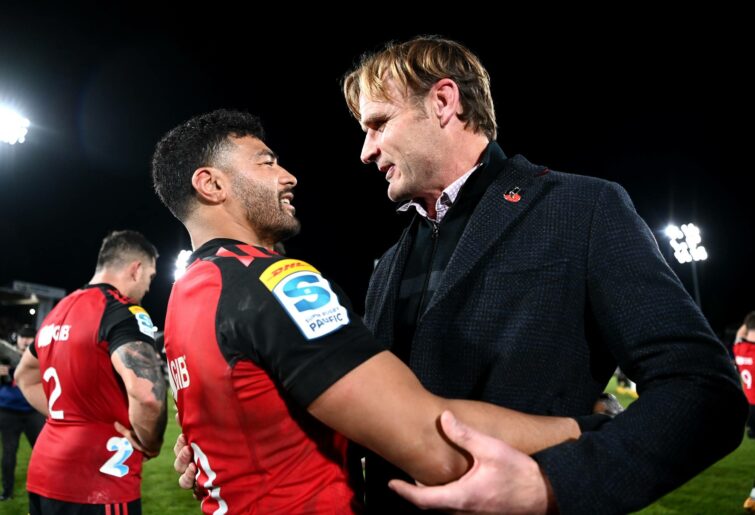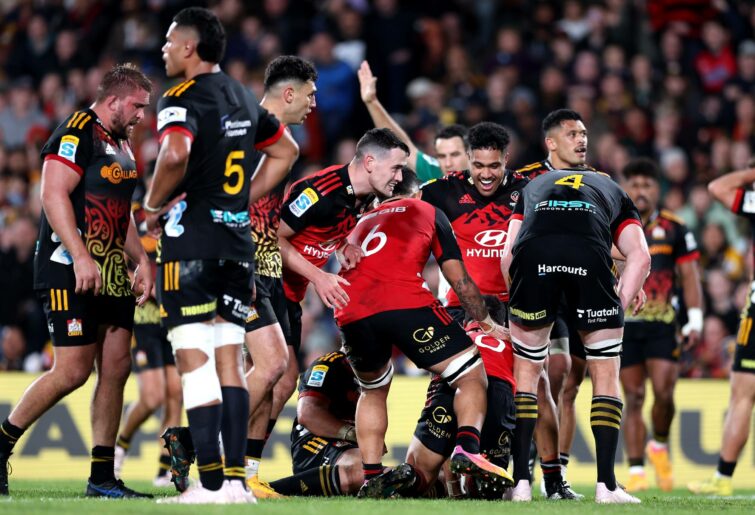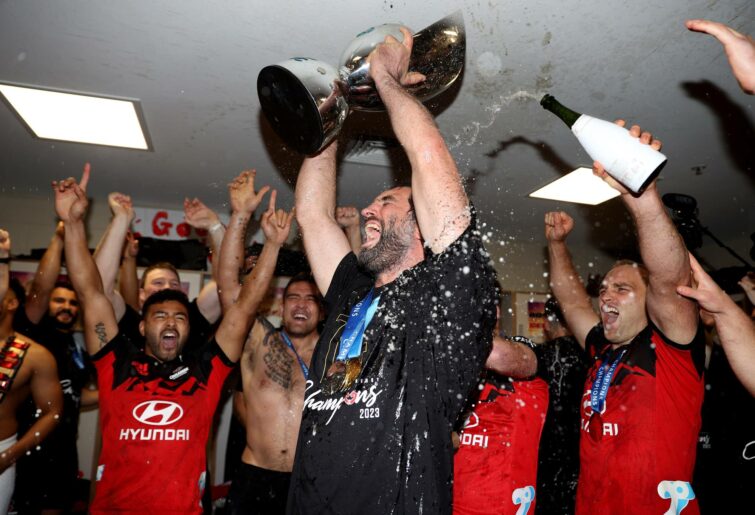It’s hard to know where to start with the remarkable Crusaders. Seventeen times Grand Finalists for what is now 14 wins. No other franchise with their name on the trophy since the Hurricanes in 2016.
Coach Scott Robertson missing only one trophy in his seven years at the helm, and that on a COVID technicality; the Crusaders unbeaten in a truncated 2021 trans-Tasman mini-competition, but excluded from the Final on points difference.
This win, 25-20 against a hot-wired, highly physical Chiefs, must rank with their best; the culmination of a difficult season where a string of first-choice players were lost to injury, where the team ploughed on regardless. And delivered.
No matter that more of the game’s dominant individuals were on the opposition side, the Crusaders’ system once again proved unimpeachable, their cohesion and teamwork elite level, and their big-match discipline far superior.
But whatever this win says for the franchise, it feels like the biggest winner from the match was the All Blacks; on two counts.
Firstly, whatever happens in France in a few months’ time, the All Blacks will start 2024 from a position of strength, knowing that, with Robertson in charge, they have a popular, talismanic, talented coach, with pockets full of secret sauce, who is the envy of the rugby world.

HAMILTON, NEW ZEALAND – JUNE 24: Richie Mo’unga of the Crusaders and Coach Scott Robertson of the Crusaders celebrate after winning the Super Rugby Pacific Final match between Chiefs and Crusaders at FMG Stadium Waikato, on June 24, 2023, in Hamilton, New Zealand. (Photo by Hannah Peters/Getty Images)
Setting aside his Waikato roots, current All Blacks coach Ian Foster also emerged a winner, with a couple of important statements made ahead of this year’s Rugby Championship and World Cup.
New Zealand may not carry a lot of depth at lock, but their top three big men, Sam Whitelock, Scott Barrett and Brodie Retallick, all played the house down. In a big match as physical and intense as this was, that’s exactly what you want to see from your power forwards; not just their physical presence but, with a combined tally of 303 Test matches between them, unbridled energy and thirst for the contest.
The All Blacks also look to be well served at wing, with the sparkling Emoni Narawa and Leicester Fainga’anuku both prominent, and Shaun Stevenson – unable to crack a place in the squad – again showing off his full array of skills.
Both playmakers, Richie Mounga and Damian McKenzie, were again inventive and effective, albeit McKenzie’s influence on the game waned as the Crusaders’ pack lifted, to own the final 15 minutes.
And what about Luke Jacobsen, whose hard shoulders have been a feature of Super Rugby’s last month? His hit and steal from Will Jordan in the first half, which led to Stevenson’s scything run and score, was a standout individual highlight in a match that contained many.
If you get the chance, take a second look at the final ruck in the lead-up, before the ball was freed to Stevenson. A run by hooker Samisoni Taukei’aho had been stopped, with the Crusaders threatening to blow over the ball and steal it.
No such luck; the dual clean-out by Retallick and Pita Gus Sowakula a thing of sheer beauty. This is the type of work that often passes unnoticed. But without it, this try doesn’t get scored.
The trouble for the Chiefs was that the Crusaders owned more of those moments; Barrett, Whitelock and Tom Christie riding the Chiefs’ physical assault, giving back as good as they got.
Following their own template from recent weeks, the Chiefs were happy to engage in a kicking duel from the back; wary of the Crusaders and conceding penalties and cheap points in their own half.
After half-time however, there was a noticeable change in approach, with McKenzie running the first ball back, and his teammates following suit, to good effect. 10-15 soon became 20-15 and all the wind was in the Chiefs’ sails.
Their second try, to Narawa was a set-piece stinger; McKenzie beautifully collecting a tough pass on the run, and an inside-outside exchange too slick for the defence.
Narawa thought he had a second, with McKenzie again the provider on a thrilling curved run, but TMO Brendon Pickerill deemed otherwise. The try reversal was roundly described afterwards as “technical,” but McKenzie was plainly offside, not back 10 metres from the lineout. This was nothing more than one of rugby’s core laws being correctly applied.
Another crucial moment came when Stevenson nicely weighted a grubber through for himself to follow, where any sort of second contact would have had him beyond the fullback and likely scoring. An untimely air-swing however, killed the opportunity.
The Crusaders were deadly from set piece, too; Codie Taylor notching a double from their dependable line-out maul/drive, and a cracking team try coming in the 35th minute, from a midfield lineout.
Slick movement opened up space for Jordan and Fainga’anuku down the left side, before halfback Mitchell Drummond switched on to the need to recycle and transfer quickly; Mo’unga over the line in a flash, before the Chiefs’ defence could even begin to think about being set.

Richie Mo’unga of the Crusaders celebrates with his team after scoring a try during the Super Rugby Pacific Final (Photo by Phil Walter/Getty Images)
Where the Chiefs had owned the third quarter, it was a sustained spell entering the final quarter that swung the game back to the visitors. Controlling possession, the Crusaders wrested the tempo of the match back from the Chiefs, edging their way back upfield, slowly but surely, going to their lineout multiple times, until Sam Cane became the third player sin-binned.
Where their attack had been incisive and purposeful, the Chiefs were now in flaccid, side-to-side, hope rather than conviction, mode; the Crusaders forcing them backwards with every phase, into eventual submission.
There’s a view held by many, in Australia and New Zealand, that the Crusaders’ dominance of Super Rugby is bad for the game. In the sense that it would be good for fans of other franchises to experience the joy of winning, for those clubs to be able to leverage a title into increased member numbers and sponsor dollars, then, yes, of course.
But that’s really an answer to a different question. Super Rugby is an elite, professional competition and if a side as good as the Chiefs can’t win it, then that’s exactly as it should be. Nobody should ever have to apologise or feel bad about rewarding excellence.
The Crusaders aren’t superhuman; they comprise a bunch of young men just like all of the other franchises, who work hard at their craft.

Samuel Whitelock celebrates with teammates in the sheds (Photo by Phil Walter/Getty Images)
The message to other franchises, Australian and New Zealand, is clear and simple: get your back office in order, get your coaching and support staff aligned, build player depth, work hard on improving skills and teamwork, get an experienced leader like Whitelock to teach young players how to prepare properly for finals footy, and play out of your skins every week.
Continuing a trend in these finals for losing coaches to take thinly-veiled swipes at the officials, Chiefs coach Clayton McMillan didn’t quite cover himself in glory, post-match. To be clear, Jason Holland, Stephen Larkham and McMillan are all excellent coaches and good men, who can be excused, in the heat of the moment, for expressing disappointment at falling short.
What they also have in common is that, to a man, their complaints were unfounded.
No one expects the nebulous SANZAAR to do anything to curb this kind of criticism, which is actually part of the problem. With Super Rugby existing in a leadership vacuum, coaches have leeway to talk down officials, safe in the knowledge that, unless they go the full Ricky Stuart, there will be little or no blowback.
It is true, of course, that sides do cop rough decisions, and that sometimes, these influence the result. Phone calls and letters of explanation and apology from referees boss Mitch Chapman to the franchises are a regular occurrence.
But that’s not what we’re talking about here. Hurricanes, Brumbies and Chiefs fans should not be encouraged by their coach to carry forward any false notion that the match officials contributed to their defeats. And most definitely, youngsters new to rugby most should not have it reinforced that it is ok – no matter how guarded the comments – to blame the referee for a loss.
In the case of McMillan, questioning the three yellow cards dished out to his players, the officials did in fact get one of them wrong; Anton Lienert-Brown’s card should have been red instead of yellow.
McMillan’s side enjoyed a great season, much of it due to the work put in by him and his coaching team. On this one, he should zip it and quit while he’s ahead.
Lienert-Brown’s action warrants further discussion, given that, by the letter of the current foul-play framework, it seemed like a clear-cut red card. TMO Pickerill, however, opted to apply mitigation, ruling that Dallas McLeod had contributed to the head-on-head contact by dipping slightly.
This view wasn’t supported by the video evidence, and failed also to account for Lienert-Brown having a 30m uninterrupted run at McLeod; ample opportunity to remind himself to bend at the waist and tackle lawfully.
There were other concerns, too. Despite the forceful collision, McLeod wasn’t removed instantly for assessment, and Lienert-Brown wasn’t assessed at all. It was as if being sat down in a white chair for 10 minutes overrode the need for an HIA.
All very messy and unsatisfactory, albeit Lienert-Brown has since been cited and had his card upgraded to red. With Ian Foster no doubt delighted with what he saw in the match, a looming suspension for his dependable centre shapes as the only handbrake for the All Blacks.
On the positive side, this incident – and the sin-binning and subsequent upgrade to red for the Junior Wallabies’ Marley Williams in their hard-fought 47-36 win over Fiji – was evidence of the revamped on-field process for foul play working smoothly.
Relieved of the responsibility for on-field adjudication of red cards – often a very difficult proposition with potentially huge consequences for the match – referee Ben O’Keeffe was allowed to quickly hand Lienert-Brown over to Pickerill, and get on with the match.
Perhaps the lesson to be learned from this is that, no matter how desirable and welcome improvements to the system are, where there are humans involved, nothing is ever perfect. Except, perhaps, when it comes to the Crusaders.































































































